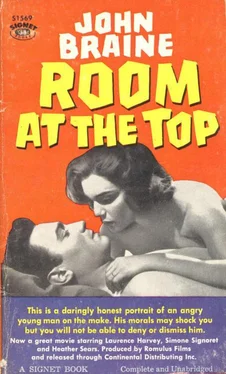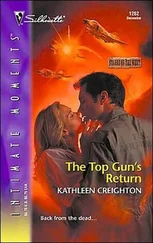John Braine - Room at the Top
Здесь есть возможность читать онлайн «John Braine - Room at the Top» весь текст электронной книги совершенно бесплатно (целиком полную версию без сокращений). В некоторых случаях можно слушать аудио, скачать через торрент в формате fb2 и присутствует краткое содержание. Жанр: Современная проза, на английском языке. Описание произведения, (предисловие) а так же отзывы посетителей доступны на портале библиотеки ЛибКат.
- Название:Room at the Top
- Автор:
- Жанр:
- Год:неизвестен
- ISBN:нет данных
- Рейтинг книги:3 / 5. Голосов: 1
-
Избранное:Добавить в избранное
- Отзывы:
-
Ваша оценка:
- 60
- 1
- 2
- 3
- 4
- 5
Room at the Top: краткое содержание, описание и аннотация
Предлагаем к чтению аннотацию, описание, краткое содержание или предисловие (зависит от того, что написал сам автор книги «Room at the Top»). Если вы не нашли необходимую информацию о книге — напишите в комментариях, мы постараемся отыскать её.
Room at the Top — читать онлайн бесплатно полную книгу (весь текст) целиком
Ниже представлен текст книги, разбитый по страницам. Система сохранения места последней прочитанной страницы, позволяет с удобством читать онлайн бесплатно книгу «Room at the Top», без необходимости каждый раз заново искать на чём Вы остановились. Поставьте закладку, и сможете в любой момент перейти на страницу, на которой закончили чтение.
Интервал:
Закладка:
For all that, I was beginning to find certain details of living in Dufton a bit too sordid to be funny. I was very fond of Aunt Emily and Uncle Dick and even their two sons, Tom and Sydney, thirteen and fourteen respectively, noisy and clumsy and clueless, heading straight for the mills and apparently perfectly happy about it. I even had a slight feeling of guilt about leaving Dufton, because I knew that the monthly eight pounds which I gave her had been a great help to her. But I couldn't stay in her world any longer. Already, drying my face and hands on a large soft towel, looking out of the corner of my eye at the dressing gown hanging behind the door (I used to watch that garment as if I were frightened it would run away) and breathing the room's odour of perfume and cleanliness, I had a footing in a very different world.
I went back to my room and changed my collar and brushed my hair. Looking at myself in the minor, I suddenly felt entirely alone. I had a childish longing for the ugly rooms and streets where to be hungry or lost wasn't possible; for the familiar faces which might bore or irritate but never hurt or betray. I don't suppose that homesickness can entirely be avoided; but I had all mine in one concentrated dose of a few seconds that first day, and I never suffered from it again.
I looked out of the window. The back garden was surprisingly large. It was bordered by a privet hedge and there was a big apple tree at the far end. There were two cherry trees next to it; I remembered my father telling me once that cherry trees can't flourish by themselves. "They have to be wed afore they're fruitful," he'd added, innocently pleased at the image. Father had never possessed a garden of his own, only a plot at the municipal allotments. No apple trees, no cherry trees, no lawn, no privet hedge ...
I straightened my tie and went downstairs to the drawing room. I'd hardly been there five minutes when Mrs. Thompson came in with the coffee. She brought it on a silver tray; I wondered how much money was coming into the house. She'd told me in her letter that her husband taught English at the Grammar School; but that didn't seem sufficient to explain their standard of living. It wasn't only the tray and coffeepot which impressed me - they might, after all, have been wedding presents - but the cups and milk jug and sugar bowl. They were thin and translucent and enamelled in clear primary colours - red, blue, yellow, orange - and I knew that they were expensive because of their lack of ornament and the deep glow of the enamel. I've an instinct like a water diviner's where money's concerned; I was certain that I was in the presence of at least a thousand a year. When I noticed the matter-of-fact way in which Mrs. Thompson handled the coffee set, without a trace of that expression of mingled pride and anxiety which most women assume on bringing out good china, I increased the amount by five hundred.
"We've never had a lodger before," she said as she handed me my coffee. Her voice paused perceptibly at the word lodger as if considering and rejecting all the euphemisms - paying guest, young gentleman to stay with us, and so on. "But I've suffered from landladies myself in my younger days. I do want you to understand, Joe, that your room's entirely your own. And you must bring your friends any time you like." She hesitated. "If ever you feel lonely - it's always a little strange at first, living in a new place - you'll be very welcome down here. Is this the first time you've been away from home? Apart from the Forces, I mean?"
"It is and it isn't. My father and mother were killed during the war and I've been living at my Aunt Emily's." I was going to pronounce Aunt with a broad a but decided not to attempt it yet.
"What sort of place is Dufton exactly?"
"A lot of mills. And a chemical factory. And a grammar school and a war memorial and a river that runs different colours each day. And a cinema and fourteen pubs. That's really all one can say about it."
"You haven't a theatre then?"
"The Nonconformists work their way through Abe Heywood's catalogue each winter. I used to go into Manchester if I wanted to see a show. There isn't anything in Dufton."
To Charles and me it was always Dead Dufton and the councillors and chief officials and anyone we didn't approve of were called zombies. At first we used to number them: "Zombie Number Three," Charles would say, referring to his boss, the Librarian, "made a joke today. It's pathetic when they pretend to be alive, n'est-ce pas?" When Number Ten was reached, it became difficult to remember whom we meant, so we adopted another system. "The Fat Zombie's been watering the beer again," I'd remark as the landlord of the Dufton Horseman waddled by in a new worsted suit. "He didn't come by that new shroud honestly." And there was the Washable Zombie, the grocery manager who was always talking about baths, and the Smiling Zombie, who ran a clothing club and a moneylender's. There were many others; we knew a great deal about the people of Dufton. Much more, for instance, than the Adulterous Zombie and the Childloving Zombie, two of the town's most prominent citizens, realised; if they had, we shouldn't have kept our jobs very long.
"We have a very good Little Theatre in Warley," Mrs. Thompson said. "The Warley Thespians - silly name really. You must come to our next social evening, Joe. They'll snap you up - men are scarce."
I raised my eyebrows.
"Male actors, I should have said." She smiled. "Though handsome young bachelors are greatly in demand too. Have you done any acting?"
"A little at camp concerts, But I didn't have much spare time at Dufton. And to tell you the truth, I didn't much fancy Careless Cyril Comes a Cropper and Peggy's Prize Packet ."
"You've made those up," she said, appearing rather pleased with me on that account. "Though I admit they've got the Heywood flavour."
"It was Charles actually," I said. "My friend Charles Lufford. We've known each other since we were children."
"You're very fond of him, aren't you?"
"We're as close as brothers. A great deal closer than most brothers." I remembered Charles's plump face with its absurdly large horn-rimmed spectacles and its mixed expressions of innocence and bawdy cheerfulness; I used to say that he looked like a parson on the razzle. "There's nothing in Dufton, Joe. Leave it before you become a zombie too ..." I could hear his deep, rather beery voice so distinctly that he might have been in the same room. "When you go to Warley, Joe, there'll be no more zombies. Remember that. No more zombies."
"You'll miss him," Mrs. Thompson said.
"Yes. I'll get over it, though - " I paused, not quite knowing how to express myself.
"I think men's friendships are much deeper than women's," Mrs. Thompson said. "But not so possessive, they never stand in each other's way." She didn't say that she knew what I meant; but the effect was as if she had; with her usual efficiency she saved me the embarrassment of explaining that I wasn't heartbroken about leaving Charles but that I wasn't totally unaffected by it either.
The clock struck the half hour and Mrs. Thompson said that she'd better attend to the chicken. When she'd left the room I lit a cigarette and walked over to the mantelpiece. Hanging over it was a large framed photograph of a young man in RAF uniform with the white air-crew slip in his cap. He had dark thick hair, a full mouth held very firmly, and heavy eyebrows. He was smiling with his eyes - Mrs. Thompson's trick. He was good-looking; he was also charming, a quality which doesn't often come through in photographs.
Charm was a favourite object of discussion between Charles and myself; we had the notion that if only we could learn how to use it our careers would be much benefited. The possession of charm wasn't in itself a guarantee of success, but it seemed to follow ambition like a pilot fish. It wasn't a highly esteemed quality in Dufton, though. Bluntness was the fashion; as Charles said, everyone behaved as if they were under contract to live up to the tradition of the outspoken Yorkshireman with a heart of gold underneath a rough exterior. The worst of it was, he'd add, that underneath the rough exterior their hearts were as base and vicious as anyone's from the Suave and Treacherous South. Not, I think, that they were entirely to be blamed; there wasn't much room for gracious living in Dufton. The young man in the photograph (obviously Mrs. Thompson's son who'd been killed during the war) had been given from birth the necessary background for charm. It's astounding how often golden hearts and silver spoons in the mouth go together.
Читать дальшеИнтервал:
Закладка:
Похожие книги на «Room at the Top»
Представляем Вашему вниманию похожие книги на «Room at the Top» списком для выбора. Мы отобрали схожую по названию и смыслу литературу в надежде предоставить читателям больше вариантов отыскать новые, интересные, ещё непрочитанные произведения.
Обсуждение, отзывы о книге «Room at the Top» и просто собственные мнения читателей. Оставьте ваши комментарии, напишите, что Вы думаете о произведении, его смысле или главных героях. Укажите что конкретно понравилось, а что нет, и почему Вы так считаете.











